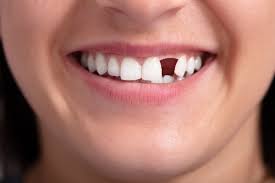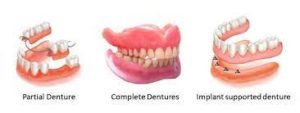 It’s common for adults to lose a tooth often due to gum disease, tooth decay, or injury. Patients often skip replacing the teeth if it doesn’t affect their appearance, However, that’s not the best idea. The teeth play a vital role in the appearance and symmetry of the face. They play a key role in occlusion, or how your jaw closes and lines up. Missing a tooth, even just one, can cause severe and permanent damage to your entire mouth.
It’s common for adults to lose a tooth often due to gum disease, tooth decay, or injury. Patients often skip replacing the teeth if it doesn’t affect their appearance, However, that’s not the best idea. The teeth play a vital role in the appearance and symmetry of the face. They play a key role in occlusion, or how your jaw closes and lines up. Missing a tooth, even just one, can cause severe and permanent damage to your entire mouth.
Leaving an empty space will put you at risk for the following: Your remaining teeth might move in to the gaps and may become crooked leading to new gaps that are harder to clean, increasing your risk of tooth decay(cavities), gum disease and eventually tooth loss. The tooth shift might also lead to bite alignment issues and uneven wear from chewing, which might cause trouble eating and TMJ problems.
A period of 3 to 6 months after a tooth extraction is recommended to allow the area to fully heal. A longer waiting period might cause more bone loss in the jaw. There are three possible options for replacing a tooth which are to use a removable denture, to have a fixed dental bridge, or a long-lasting dental implant.
Removable Partial Denture
Temporary Denture
Bridge
Dental Implant
Dental Implants
Dental implants are titanium metal fixtures that are surgically fixed to your jawbone, onto which artificial teeth can be attached. These titanium metal implants fuse to your bone by the process of osseointegration.
Dental implants are considered to be the best options to replace missing or damaged teeth. An implant-supported bridge is an ideal solution for multiple missing teeth in a row. Dental implants have a high success rate of around 95%, and they lead to an increased quality of life for many people. The procedure itself is not painful since it is performed with either general or local anesthesia to completely numb the mouth. After dental implantation, once the numbness wears off, mild pain may be noticed by the patient.
While the implant procedure is indeed deemed to be safe, having implants put in is a surgical procedure. As with any surgical procedure, there are risks involved such as infections, gum recession, and nerve and tissue damage. While the possibility of infection or rejection is real, the percentage of patients who end up having problems after having implant surgery is tiny.











